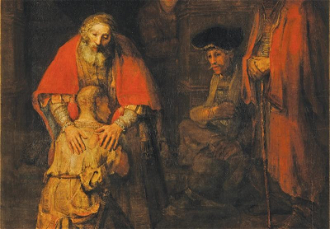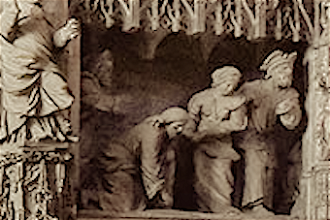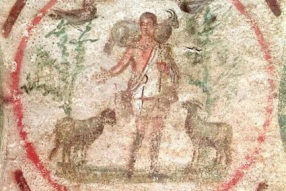Pax Christi Reflection for Fourth Sunday in Lent

Return of the Prodigal Son - Rembrandt
No person may be lost; God's mercy is inclusive
It is good to come home after a tiring workday, or after a long stay elsewhere. Back home - to know and to feel that you are welcome in a warm and loving environment. Unfortunately, this is not a given for everyone. We think of the many refugees who camp at borders or in railway stations and who do not know where they will ever be at home again.
We also think in this Lenten time of the people in countries such as Colombia or Guatemala. The Lenten fasting campaign reminds us about people in these or other countries where mighty companies and large landowners try to deprive them of their home and land. But people go into peaceful resistance. The desire to come home lives in each of them and also in us. People need ground under their feet and a roof over their heads to feel at home.
Opening a new future
Coming home may also be the youngest son in the gospel after taking a serious step into the world. Before that happened, he had gone through a whole process in himself. He comes to think, says the gospel. But it is stronger: he comes to himself. He now realizes who his father really is, the father he left behind. With that father he can return home unconditionally. In the process that brings him to that recognition, he also recognises himself as a son again. Now he knows who he is: child of his father, at home in the love of his father. If you can come home so well that you can be acknowledged and accepted in spite of everything you have done, then that is really a reason to party.
For the prodigal son, the past became irrelevant. The present became concrete, opening up a new future. He broke free of the chains of humiliation and guilt caused by earlier selfish mistakes. He trusted another, one whom he knew had once loved him, to be loving enough to give him a new start. He trusted himself enough to take it. Often it is this latter ingredient that is missing when we need to turn to our Father or to one another for forgiveness and reconciliation. Despite this hesitancy, we must never defer the opportunity to let go of selfishness, guilt or hurt in order to be reconciled.
Characters in conflict
The gospel story tells us also about the oldest son who never left home and worked hard all his life. But has it ever really been his home? Has he ever really known his father as he is: all love? Or did that father stay with him only from a distance, demanding and never granting him anything? In fact, the eldest son was never really a son and the father was not really 'father' to him. How it ends for that eldest son remains open in the story. The choice is there for us. Which way do we want to go? Refuse the love of the father, or go through the process that brings us back home with him?
We are allowed to listen to the call that emanates from people elsewhere: from people in Guatemala or Colombia who want to live in peace; from people who want a home for their children and themselves. They call us to know that we are connected to them, to share their desire that there is a home for everyone. Hearing that call can help us recognise ourselves as who we really are: children of the same Father, of a God who makes us brothers and sisters.
Life is a series of decisive moments strung together by daily routine and ongoing creativity. It is good to recall and to savour, if not always to celebrate, these key moments when the "Yes" or the "No", the "I will" or the "I will not", the "I'll stay" or the "I'll leave," changed our lives forever. Recognising and owning such moments awakens us to the realisation that the quality of daily life and of our lifestyle, as well as of our future, is sometimes much more under our control than we care to take responsibility for. Blaming others for the ills of the world, real and imaginary, is very often quite pointless. Being willing to choose the better option in every humdrum situation enables us to go for the gold at the major decisive moments when they arise.
God's mercy is the new sound in the gospel. The story of a father whose heart still goes out to that runaway youngest son. On his return he sees him from afar. He kisses him, puts him in new clothes and gives him another ring on his finger. And there must be a party. But the father also wants the oldest son who feels the short end of things. He is looking for the eldest son. He listens to his anger and his annoyance. But the father disarms and brings together both the oldest and the youngest son. God's mercy is inclusive. A new beginning is possible.
Reconciliation is restoring broken relations
A key task of the Christian peace movement is the restoration of broken relations. This reconciliatory work must take place on all levels: individually, within one's own family and society, and between population groups, nations and religions. Reconciliation is only possible when the various parties acknowledge fault (and are ashamed of past mistakes), ask for, and receive forgiveness. Injustice remains injustice and that is something we should point out. Fault is something we must acknowledge and confess to. We shall respect and return everyone's dignity. It comes down to a willingness to start over again. Willingness to reconcile is the turning point.
A certain measure of empathy is needed to imagine someone else's pain, hurt and mistakes. This is a reciprocal process. You must think with your heart and feel with your mind. Reconciliation is not possible without having first put yourself in another's shoes. In times of crisis, it is also a matter of learning from and living with changes.
Icon of reconciliation
For many years Pax Christi sections and many faith groups have been working with the "Icon of Peace and Reconciliation of Pax Christi International."[i] The icon offers a deep spirituality about forgiveness and restoration of relations. Thinking together, meditating and exchanging ideas about the big challenges of the present day and looking for solutions that leads to new cooperation and possible reconciliation.
Lent is a key stage in our relationship with God. There is no doubting the offer of the Father's merciful reconciliation and the opportunity of new beginnings. It is accepting or not this offer that is our decision. The prodigal son decided wisely and came home to the one who loved him. God leaves nobody behind.
For more Lenten resources and an archive of these reflections, click HERE.
Rev Paul Lansu is Senior Policy Advisor, Pax Christi International





















